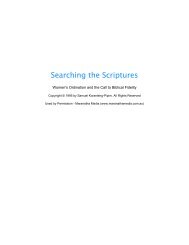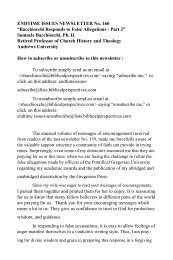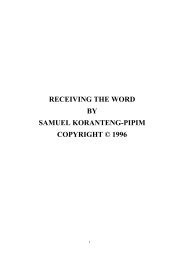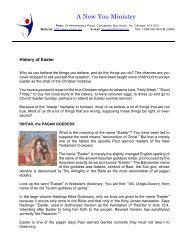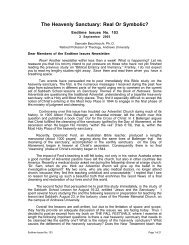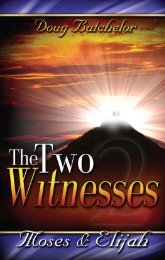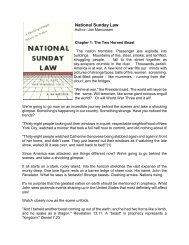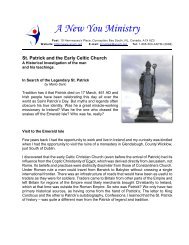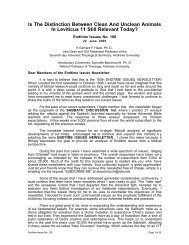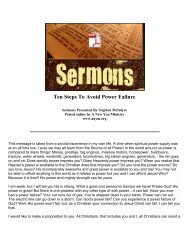Bible Readings for the Home Circleâ1914 - A New You Ministry
Bible Readings for the Home Circleâ1914 - A New You Ministry
Bible Readings for the Home Circleâ1914 - A New You Ministry
You also want an ePaper? Increase the reach of your titles
YUMPU automatically turns print PDFs into web optimized ePapers that Google loves.
BIBLE READINGS<br />
serve to represent <strong>the</strong> nations and <strong>the</strong>ir kings, were successively broken<br />
by <strong>the</strong> iron monarchy of Rome.” “Decline and Fall of <strong>the</strong> Roman<br />
Empire,” chap. 38, par. 1, under “General Observations,” at <strong>the</strong><br />
close of <strong>the</strong> chapter.<br />
18. What was indicated by <strong>the</strong> mixture of clay and iron in <strong>the</strong> feet<br />
and toes of <strong>the</strong> image<br />
“And whereas thou sawest <strong>the</strong> feet and toes, part of potters’ clay, and<br />
part of iron, <strong>the</strong> kingdom shall be divided.” Dan. 2:41.<br />
19. In what prophetic language was <strong>the</strong> varying strength of <strong>the</strong> ten<br />
kingdoms of <strong>the</strong> divided empire indicated<br />
“And as <strong>the</strong> toes of <strong>the</strong> feet were part of iron, and part of clay, so <strong>the</strong><br />
kingdom shall be partly strong, and partly broken [margin, brittle].” Verse 42.<br />
20. Were any ef<strong>for</strong>ts to be made to reunite <strong>the</strong> divided empire of<br />
Rome<br />
“And whereas thou sawest iron mixed with miry clay, <strong>the</strong>y shall mingle<br />
<strong>the</strong>mselves with <strong>the</strong> seed of men: but <strong>the</strong>y shall not cleave one to ano<strong>the</strong>r,<br />
even as iron is not mixed with clay.” Verse 43.<br />
NOTES.— Charlemagne, Charles V, Louis XIV, and Napoleon all tried<br />
to reunite <strong>the</strong> broken fragments of <strong>the</strong> Roman Empire, but failed. By<br />
marriage and intermarriage ties have been <strong>for</strong>med with a view to<br />
streng<strong>the</strong>ning and cementing toge<strong>the</strong>r <strong>the</strong> shattered kingdom; but<br />
none have succeeded. The element of disunion remains. Many political<br />
revolutions and territorial changes have occurred in Europe since<br />
<strong>the</strong> fall of <strong>the</strong> Roman Empire in 476 A.D.; but its divided state still<br />
remains.<br />
This remarkable dream, as interpreted by Daniel, presents in <strong>the</strong><br />
briefest <strong>for</strong>m, and yet with unmistakable clearness, <strong>the</strong> course of world<br />
empires from <strong>the</strong> time of Nebuchadnezzar to <strong>the</strong> close of earthly history<br />
and <strong>the</strong> setting up of <strong>the</strong> everlasting kingdom of God. The history<br />
confirms <strong>the</strong> prophecy. The sovereignty of <strong>the</strong> world was held by<br />
Babylon from <strong>the</strong> time of this dream, B.C. 603, until B.C. 538, when it<br />
passed to <strong>the</strong> Medes and Persians. The victory of <strong>the</strong> Grecian <strong>for</strong>ces<br />
at <strong>the</strong> battle of Arbela, in B.C. 331, marked <strong>the</strong> downfall of <strong>the</strong> Medo-<br />
Persian Empire, and <strong>the</strong> Greeks <strong>the</strong>n became <strong>the</strong> undisputed rulers of<br />
<strong>the</strong> world. The battle of Pydna, in Macedonia, in B.C. 168, was <strong>the</strong> last<br />
organized ef<strong>for</strong>t to withstand a world-wide conquest by <strong>the</strong> Romans,<br />
and at that time <strong>the</strong>re<strong>for</strong>e <strong>the</strong> sovereignty passed from <strong>the</strong> Greeks to<br />
<strong>the</strong> Romans, and <strong>the</strong> fourth kingdom was fully established. The division<br />
of Rome into ten kingdoms is definitely <strong>for</strong>etold in <strong>the</strong> vision<br />
recorded in <strong>the</strong> seventh chapter of Daniel, and occurred between <strong>the</strong><br />
years 351 A.D. and 476 A.D. {208<br />
208}<br />
21. What is to take place in <strong>the</strong> days of <strong>the</strong>se kingdoms<br />
“And in <strong>the</strong> days of <strong>the</strong>se kings shall <strong>the</strong> God of heaven set up a<br />
NEBUCHADNEZZAR’S DREAM<br />
kingdom, which shall never be destroyed: . . . but it shall break in pieces<br />
and consume all <strong>the</strong>se kingdoms, and it shall stand <strong>for</strong>ever.” Verse 44.<br />
NOTE.— This verse <strong>for</strong>etells <strong>the</strong> establishment of ano<strong>the</strong>r universal<br />
kingdom, <strong>the</strong> kingdom of God. This kingdom is to overthrow and supplant<br />
all existing earthly kingdoms, and is to stand <strong>for</strong>ever. The time <strong>for</strong><br />
<strong>the</strong> setting up of this kingdom was to be “in <strong>the</strong> days of <strong>the</strong>se kings.”<br />
This cannot refer to <strong>the</strong> four preceding empires, or kingdoms; <strong>for</strong> <strong>the</strong>y<br />
were not contemporaneous, but successive; nei<strong>the</strong>r can it refer to an<br />
establishment of <strong>the</strong> kingdom at Christ’s first advent, <strong>for</strong> <strong>the</strong> ten kingdoms<br />
which arose out of <strong>the</strong> ruins of <strong>the</strong> Roman Empire were not yet in<br />
existence. It must <strong>the</strong>re<strong>for</strong>e be yet future.<br />
22. In what announcement in <strong>the</strong> <strong>New</strong> Testament is <strong>the</strong> establishment<br />
of <strong>the</strong> kingdom of God made known<br />
“And <strong>the</strong> seventh angel sounded; and <strong>the</strong>re were great voices in heaven,<br />
saying, The kingdoms of this world are become <strong>the</strong> kingdoms of our Lord,<br />
and of His Christ; and He shall reign <strong>for</strong>ever and ever.” Rev. 11:15.<br />
23. For what have we been taught to pray<br />
“Thy kingdom come. Thy will be done in earth, as it is in heaven.”<br />
Matt. 6:10.<br />
24. What event is closely associated with <strong>the</strong> establishment of God’s<br />
everlasting kingdom<br />
“I charge <strong>the</strong>e <strong>the</strong>re<strong>for</strong>e be<strong>for</strong>e God, and <strong>the</strong> Lord Jesus Christ, who shall<br />
judge <strong>the</strong> quick and <strong>the</strong> dead at His appearing and His kingdom.” 2 Tim. 4:1.<br />
25. With what prayer do <strong>the</strong> Scriptures close<br />
“He that testifieth <strong>the</strong>se things saith, Surely I come quickly. Amen.<br />
Even so, come, Lord Jesus.” Rev. 22:20.<br />
LOOK <strong>for</strong> <strong>the</strong> way-marks as you journey on,<br />
Look <strong>for</strong> <strong>the</strong> way-marks, passing one by one:<br />
Down through <strong>the</strong> ages, past <strong>the</strong> kingdoms four,—<br />
Where are we standing Look <strong>the</strong> way-marks o’er.<br />
First, Babylonia’s kingdom ruled <strong>the</strong> world,<br />
Then Medo-Persia’s banners were unfurled;<br />
And after Greece held universal sway,<br />
Rome seized <strong>the</strong> scepter,—where are we today<br />
Down in <strong>the</strong> feet of iron and of clay,<br />
Weak and divided, soon to pass away;<br />
What will <strong>the</strong> next great, glorious drama be—<br />
Christ and His coming, and eternity.<br />
F. E. BELDEN.<br />
155–156




